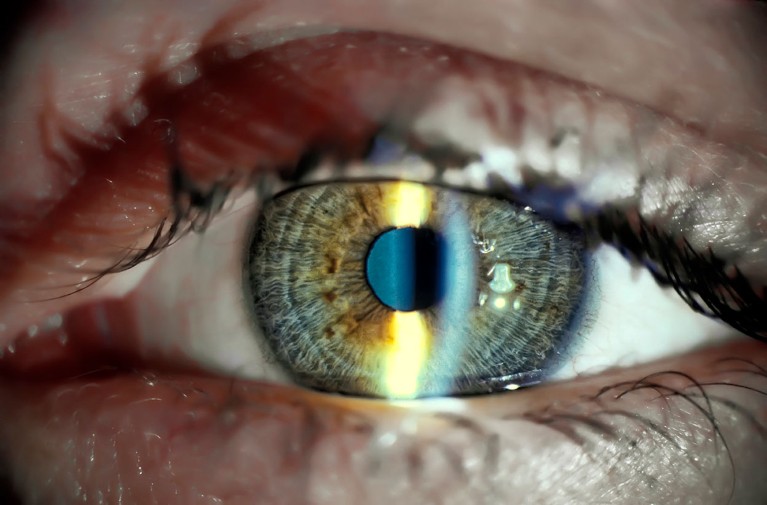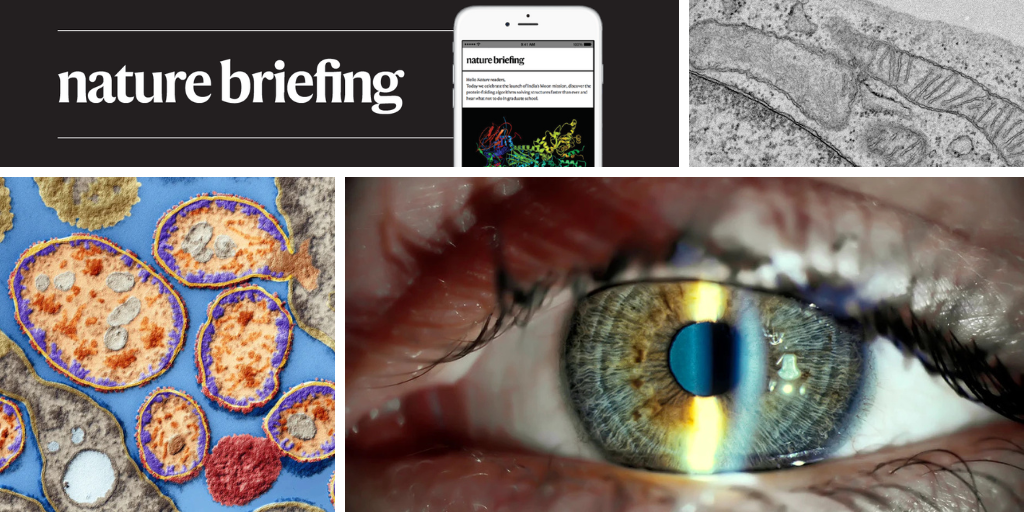Hello Nature readers, would you like to get this Briefing in your inbox free every day? Sign up here.

The transparent cornea is the outermost layer of the eye.Credit: Patrick Landmann/SPL
Three people with severely impaired vision have had their sight substantially improved by a stem-cell transplant. These improvements have now lasted more than a year. A fourth person also experienced a boost in their vision, but it did not last. The four are the first to receive a transplant of reprogrammed stem cells to treat damaged corneas, the transparent outer surface of the eye. The team behind the treatment will launch larger clinical trials next year.
Reference: The Lancet paper
Virologist Beata Halassy treated her own breast cancer by injecting the tumour with viruses she grew in the lab. In 2020, Halassy discovered she had a second recurrence of breast cancer at the site of a previous mastectomy. To avoid another bout of chemotherapy, she self-administered experimental oncolytic virotherapy. Halassy has now been cancer-free for four years. Her decision to treat herself, and subsequently publish a report detailing the process, has sparked discussion about the ethics of self-experimentation and the risk it might encourage others to try unproven treatments.
South Africa has amended its health-research ethics guidelines to include a new section on heritable (or germline) human genome editing. The move could put the nation one step closer to being the first to explicitly allow the controversial technique, which involves making genetic changes to sperm, eggs or embryos that could be passed down to future generations. Such editing could prevent inherited diseases, such as cystic fibrosis and sickle-cell disease, but it poses major ethical concerns and safety challenges.
Features & opinion
In a call to action published simultaneously across 14 journals today, microbiologist Raquel Peixoto and colleagues demand that the world “harness the power of microbiology” to safeguard the planet. From the enhancement of carbon sequestration to the cultivation of biofuels, there are a multitude of microbe-based solutions to climate problems, say the authors — but these are not being rolled out effectively at scale. It’s time to cut through the red tape, they argue, and gather a global task force to help test, fund and deploy the best of these microbiome technologies.
Nature Microbiology (and 13 other journals) | 5 min read
“We ask people to breastfeed their children for two years, but then we don’t do all the things to allow it,” says ecotoxicologist Verónica Laura Lozano. She resolved to bring her baby and partner on fieldwork trips, despite the extra uncovered cost. Her story illustrates how policies and attitudes often fail to fully support breastfeeding researchers. The Nordic countries serve as useful exemplars — for example, Norway provides up to two hours of paid time to breastfeed each day, helping to achieve breastfeeding rates above the global average.
The re-election of Donald Trump as US president is partly a sign of people’s feeling of alienation from institutions including science and higher education, writes Science Editor-in-Chief Holden Thorp. Once “an enthusiastic participant” in “animated and often confrontational banter” defending science on social media and on television, Thorp now sees those platforms as “not conducive to building trust”. To defend against those who seek to undermine the truth for political gain, he argues that the scientific community must be “more forthcoming and accessible, showing that scientists indeed update ideas when new data come along, and putting people and the public interest ahead of money and status for the powerful”.
A Nature editorial suggests that scientists need support to communicate openly with the public and speak confidently about core scientific tenets such as uncertainty, context and transparency. The editorial calls attention to a proposal from Rhys Morgan, head of research policy, governance and integrity at the University of Cambridge. He recommends that public-facing science-communication work should adhere to the same research-integrity principles that are used for scholarly publications (and provides a checklist for communicators to use to help ensure they’re doing it right).
Science | 5 min read & Nature | 5 min read
Read more: Scientists must hold President Trump to account with courage and unity (Nature | 4 min read)
Reference: League of European Research Universities advice paper
The trusty ‘powerhouses of the cell’, mitochondria, divide into two distinct forms when resources are low: one that concentrates on energy production and one that produces essential cellular building blocks. “We were as surprised as everyone that there would be this mechanism of mitochondria to become specialised subpopulations,” says cell biologist Craig Thompson. He and his colleagues say this ability could help explain how some cancers can thrive, even in hostile conditions.
On Friday, Leif Penguinson was chilling with the bison in the snow-covered Hayden Valley in Yellowstone National Park. Did you find the penguin? When you’re ready, here’s the answer.
Thanks for reading,
Flora Graham, senior editor, Nature Briefing
With contributions by Jacob Smith
Want more? Sign up to our other free Nature Briefing newsletters:
• Nature Briefing: Careers — insights, advice and award-winning journalism to help you optimize your working life
• Nature Briefing: Microbiology — the most abundant living entities on our planet — microorganisms — and the role they play in health, the environment and food systems
• Nature Briefing: Anthropocene — climate change, biodiversity, sustainability and geoengineering
• Nature Briefing: AI & Robotics — 100% written by humans, of course
• Nature Briefing: Cancer — a weekly newsletter written with cancer researchers in mind
• Nature Briefing: Translational Research — covers biotechnology, drug discovery and pharma


